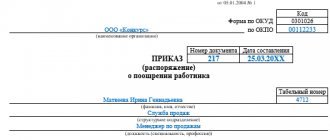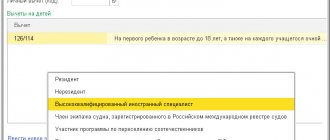What is rest time according to the Labor Code
Rest time for employees is defined as the period during which an employee can be released from duty.
During the period of such rest, a person has the right to engage in personal affairs, regardless of his location. This feature is due to the fact that types of rest time include time intervals that arise as a result of the rights granted to the employee by the employer. Below we will dwell in more detail on the features of existing types of rest time. Subject to the provisions of Art. 107 of the Labor Code of the Russian Federation, types of rest time include:
- day break;
- daily rest;
- weekend;
- days recognized as non-working days due to falling on holidays;
- vacation.
A selection of forms from ConsultantPlus will help you correctly arrange the provision of vacations. If you don't already have access to this legal system, get a trial access. It's free.
How to display vacation on the timesheet, read the article “Working time sheet on form T-12 - form.”
Concept of working time and rest time
Working time is the period intended for an employee to perform his work duties according to the company’s regulations.
The concept of rest time is established by Art. 106 Labor Code of the Russian Federation. Rest time according to the Labor Code is the interval in which a person is released from performing labor functions. Formally, rest time in labor law is a person’s stay outside his workplace. The employee has the right to use rest time at his personal discretion. During these periods, he can study, undergo treatment, fulfill family responsibilities, participate in political activities, go to the sea, etc. The purpose of rest is to restore the ability to work.
The right to rest is defined by the Constitution of our country. All types of rest time according to the Labor Code of the Russian Federation are included in the terms of employment contracts.
How long is the break during the working day?
This type of rest can last from 30 minutes to 2 hours, while the exact period is established by the employer’s internal documents. The specified time is allocated so that employees can:
- take a little break from work;
- have lunch.
This break increases the length of the working day, since it is not included in the calculation of hours worked. Exceptions are cases when:
- working conditions do not allow organizing time for such rest;
- Work is carried out at low temperatures, and there is a need for periodic heating, for which appropriate rest time is allocated.
Is it possible to split breaks for rest and food? For the answer to this question from Rostrud, see ConsultantPlus. Trial access to the system is provided free of charge.
What does daily rest mean?
Daily rest, or break, is carried out by each employee after the end of the working day. This rest period lasts until the start of the next working day. Thus, its duration depends on the work schedule provided for by the employer’s internal documents. For example, if the local document of the organization stipulates that the working hours are from 9:00 to 18:00, then rest lasts from 18:00 of the current day to 9:00 of the next day.
Note that the Labor Code of the Russian Federation provides for the concept of “overtime work,” which means performing work duties after the end of the working day.
More details about the features of overtime work and the rules for its compensation are described in the article “How is overtime work paid according to the Labor Code of the Russian Federation?” .
Rest time from Saturday to Monday is typical for all employers
Often, many employers offer work on a five-day basis, in which working days are Monday, Tuesday, Wednesday, Thursday, Friday, and Saturday and Sunday are weekends. But the Labor Code of the Russian Federation does not define these two days as days off. According to Art. 111 of the Labor Code of the Russian Federation, with a 5-day working week, employees are allocated 2 days off, with the obligatory day being Sunday. The second day off may also be Monday, which is stated in the employer’s internal documents.
If the employer is on a six-day working week, then he has one day off. In cases where work processes cannot be suspended for the “classic” weekend from Saturday to Monday, employees have the right to take a weekly rest on various days provided for by the schedule and internal documents of the employer.
In this case, the continuous duration of such rest should be at least 42 hours. Note that this period is also fixed in some provisions regulating working hours and rest. For example, such a requirement is contained in clause 26 of the Regulations on the peculiarities of the working hours and rest periods of car drivers, failure to comply with which may lead to the application of administrative liability to a legal entity in the form of a fine from 30,000 to 50,000 rubles. according to Art. 5.27 Code of Administrative Offenses of the Russian Federation.
Please note that the law defines a special procedure for paying for work on weekends.
Read more about this in our article.
Concept and types of recreation
The right to rest is enshrined in Art. 37 of the Constitution of the Russian Federation (Part 5) as an inalienable right of everyone.
At the same time, it is stated that all workers under an employment contract are guaranteed the working hours established by federal law, weekends and holidays, and paid annual leave. In other words, on the basis of an employment contract, the employee has the right to demand from the employer compliance with the established working hours, the provision of weekends and holidays, paid leave, and the employer, in turn, is obliged to satisfy these requirements and provide conditions for the employee to exercise the right to rest.
In Art. 106 of the Labor Code of the Russian Federation, rest time is defined as the time during which the employee is free from performing work duties and which he can use at his own discretion.
Consequently, rest time sets the boundaries of working time and provides the employee with the opportunity to use it depending on his interests.
The duration of rest time can be regulated both directly through the establishment of certain types of rest time and their duration, and indirectly, by establishing the duration of working time and distributing it within a certain calendar period.
For certain categories of workers, taking into account the special nature of their work, special provisions are made for the use of rest time. These features are established, in particular, in accordance with Decree of the Government of the Russian Federation of December 10, 2002 N 877 “On the features of working hours and rest time for certain categories of workers with a special nature of work.” This Resolution established that such features are determined by the relevant federal executive authorities in agreement with the Russian Ministry of Labor and the Russian Ministry of Health.
For example, the federal executive authorities adopted: Regulations on the peculiarities of working hours and rest time for employees of organizations engaged in the extraction of precious metals and precious stones from alluvial and ore deposits, approved by Order of the Ministry of Finance of Russia dated April 2, 2003 N 29n; Regulations on the peculiarities of working hours and rest periods for crew members (civilian personnel) of support vessels of the Armed Forces of the Russian Federation, approved by Order of the Russian Ministry of Defense of May 16, 2003 N 170; Regulations on the peculiarities of working hours and rest time for certain categories of fishery workers with a special nature of work, approved by Order of the State Fisheries Committee of Russia dated August 8, 2003 N 271, etc.
Collective agreements and other local regulatory legal acts of organizations (internal labor regulations, shift schedules, vacation schedules, etc.) are of great importance for the use of rest time. They may provide benefits for certain categories of employees (for example, increasing the duration of vacations), oblige employers to take into account the wishes of employees when providing various types of rest time.
Issues regarding the provision and use of rest time can also be individualized in the employment contract. The only condition: the acts listed above and the employment contract cannot provide for the deterioration of the standards established by labor legislation, collective agreements, and agreements.
The Labor Code of the Russian Federation (Article 107) provides for the following types of rest time:
- breaks during the working day (shift);
- daily (between shifts) rest;
- weekends (weekly uninterrupted rest);
- non-working holidays;
- vacation.
Breaks during the working day (shift) are provided to employees for rest and food (Article 108 of the Labor Code of the Russian Federation). The duration of breaks cannot exceed two hours and should not be less than 30 minutes. The time for granting a break and its specific duration are determined by internal labor regulations or by agreement between the employee and the employer.
At those jobs where, due to production (work) conditions, a break cannot be established, workers are given the opportunity to rest and eat food during working hours. The list of such work, as well as places of rest and meals, are established by the internal labor regulations of the organization. These breaks are not included in working hours and are not paid.
At the same time, special breaks are provided (Article 109 of the Labor Code of the Russian Federation), which are included in working hours and are subject to payment when performing certain types of work, provided that the duration and procedure for providing these special breaks are established by the internal labor regulations. These are, for example, breaks for heating and rest for employees working in the cold season in the open air or in closed, unheated rooms, as well as for loaders engaged in loading and unloading operations, and other employees in necessary cases. The employer is obliged to provide premises for heating and rest of employees.
Special breaks are also provided to women with children under the age of one and a half years for feeding the child (Article 258 of the Labor Code of the Russian Federation), etc.
Daily (between shifts) rest is breaks between shifts that last from the end of the work shift until it begins on the next working day (shift). The duration of the inter-shift break is not defined by law, however, in accordance with the regulatory legal acts in force in the labor sphere during the Soviet period, the duration of the inter-shift break, together with the lunch break, was set at no less than double the duration of the previous work shift. As a rule, this order continues to this day. Issues related to the organization and provision of inter-shift rest are resolved in industry and collective agreements.
In a number of industries, the duration of rest between two working days cannot be less than 12 hours. For example, such a break between shifts (daily rest) is established for tram and trolleybus drivers.
Weekly continuous rest (weekends) is time free from work, calculated from the end of work on the last working day of the calendar week until the start of work on the first working day of the next calendar week. Its specific duration depends on the type of work week, shift schedules and work organization.
The duration of weekly uninterrupted rest must be at least 42 hours (Article 110 of the Labor Code of the Russian Federation). With a five-day work week, employees are given two days off, and with a six-day work week, employees are given one day off. The general day off is Sunday.
The second day off in a five-day work week is established by a collective agreement or internal labor regulations (work schedule). Both days off are usually provided in a row. In organizations in which suspension of work is impossible due to production, technical and organizational conditions or due to the need for continuous constant service to the population, as well as in other organizations with continuous production, days off are provided on different days of the week in turn to each group of workers in accordance with the internal labor regulations, and during shift work - according to shift schedules approved by the organization.
Guarantees of the right to rest include the prohibition of working on any of the days off established by the work schedule. Involvement in work on a day off is allowed only in exceptional cases and is carried out on the basis of a written order (instruction) of the employer. The list of cases when such involvement is allowed with the written consent of the workers themselves is indicated in Part 2 of Art. 113 of the Labor Code of the Russian Federation, and in part 3 of Art. 113 of the Labor Code of the Russian Federation - without the consent of the employee. An employee may be required to work on a day off and in other cases, but then, in addition to the employee’s consent, the opinion of the elected body of the primary trade union organization must be taken into account (Part 5 of Article 113 of the Labor Code of the Russian Federation).
It is prohibited to employ pregnant women (Article 259 of the Labor Code of the Russian Federation) and workers under the age of 18 (Article 268 of the Labor Code of the Russian Federation) to work on weekends.
Disabled people and women with children under three years of age may be involved in work on weekends only with their consent and provided that this is not prohibited for them due to health reasons.
Temporary workers who have entered into an employment contract for a period of up to two months (Article 290 of the Labor Code of the Russian Federation) may be required to work on weekends.
Holidays according to their significance are divided into non-working holidays (these are, as a rule, days dedicated to outstanding events) and others, for example, professional holidays, memorial days, which, as a rule, coincide with weekly days off.
Article 112 of the Labor Code of the Russian Federation establishes days that are non-working holidays: January 1, 2, 3, 4, 5, 6 and 8 - New Year holidays; January 7—Christmas Day; February 23 - Defender of the Fatherland Day; March 8 - International Women's Day; May 1 - Spring and Labor Day; May 9 - Victory Day; June 12—Russia Day; November 4 is National Unity Day. Subjects of the Russian Federation may establish other non-working holidays on their territory, taking into account the national and cultural characteristics of the region.
In addition to generally established non-working holidays, there are professional holidays (Metallurgist's Day, Teacher's Day, Builder's Day, etc.), which are timed to coincide with weekends according to the calendar. If such holidays fall on working days, then release from work in practice is carried out on the basis of a collective agreement or an order (instruction) of the employer.
For the purpose of rational use by employees of weekends and non-working holidays, weekends may be transferred to other days by federal law or a regulatory legal act of the Government of the Russian Federation. In this case, the regulatory legal act of the Government of the Russian Federation on the transfer of days off to other days in the next calendar year is subject to official publication no later than a month before the start of the corresponding calendar year. The adoption of regulatory legal acts of the Government of the Russian Federation on the transfer of days off to other days during the calendar year is permitted subject to the official publication of these acts no later than two months before the calendar date of the established day off.
Working on non-working holidays is generally prohibited. Employees may be involved in work on non-working holidays established for them only with their written consent and taking into account the opinion of the elected trade union body of this organization in the event of the need to perform unforeseen work, on the urgent completion of which the normal work of the organization as a whole or its individual members depends in the future structural divisions, individual entrepreneurs. In Part 3 of Art. 113 of the Labor Code of the Russian Federation lists cases when the involvement of workers on weekends and non-working holidays is permitted without their consent (for example, to prevent or eliminate an industrial accident, catastrophe, accidents, etc.). The list of these cases is exhaustive.
Involvement of disabled people and women with children under three years of age to work on non-working holidays is permitted unless such work is prohibited for them for medical reasons. At the same time, these persons must be informed in writing of their right to refuse to work on weekends and non-working holidays (Article 113 of the Labor Code of the Russian Federation). It is prohibited to involve pregnant women in work on holidays (Article 259 of the Labor Code of the Russian Federation) and workers under the age of 18 (Article 268 of the Labor Code of the Russian Federation).
Temporary workers who have entered into an employment contract for a period of up to two months (Article 290 of the Labor Code of the Russian Federation) may be required to work on holidays.
Employees are recruited to work on non-working holidays by written order of the employer. In the event that an employee does not give his consent, this cannot be considered a disciplinary offense.
The presence of non-working holidays in a calendar month is not grounds for reducing wages for employees receiving a salary (official salary).
Work on a weekend or a non-working holiday is paid at least double the amount according to the rules established in Art. 153 Labor Code of the Russian Federation. Collective agreements and wage regulations may provide for higher pay for work on public holidays.
At the request of an employee who worked on a day off or a non-working holiday, he may be given another day of rest. Work on such a day is paid in a single amount, but a day of rest is not subject to payment (Part 3 of Article 153 of the Labor Code of the Russian Federation).
Some categories of workers have the right to additional days off, but these are, as a rule, not days provided for rest in order to restore the employee’s energy potential, but targeted or compensation days, for example, for caring for disabled children (Article 262 of the Labor Code of the Russian Federation) or to restore strength after the day of donating blood (Article 186 of the Labor Code of the Russian Federation).
Which days are non-working holidays?
Taking into account the norms of Art. 112 of the Labor Code of the Russian Federation, holidays include:
- January 1–8;
- February 23;
- March 8;
- May 1 and 9;
- 12 June;
- November 4.
It is important to note that working on holidays has a number of nuances:
- Employees are allowed to work on such days only with their written consent.
- It is mandatory to draw up a written order from the manager.
- Some employees may work on public holidays only if not prohibited by medical advice. This:
- disabled people;
- mothers of children under 3 years old;
- pregnant women.
- for piecework work, payment is based on 2 times the piecework rate;
- when working at a tariff rate - at least 2 tariff rates;
- if there is a salary - from the salary rate (if the work is within the monthly norm according to the Labor Code), in double the amount (above the monthly norm).
Read about the peculiarities of working on holidays in this material.
Another comment on Art. 106 Labor Code of the Russian Federation
1. The part of astronomical, or calendar, time that is outside working hours is non-working time. Article 106 of the Labor Code of the Russian Federation defines it as rest time. Rest time is used by the employee to meet personal needs, fulfill family responsibilities, for rest, restoration of labor potential, personal development, improving educational levels, improving health, participation in various spheres of public and cultural life, realization of civil, political, socio-economic rights and freedoms . Given the very diverse ways in which rest time is used, the conventional nature of this term is obvious.
2. The right to rest is proclaimed by Art. 37 of the Constitution of the Russian Federation is an inalienable right of everyone. This right includes the right to a reasonable limitation of working hours, weekends and holidays and paid annual leave. The content and objectives of the legal regulation of rest time are, firstly, to ensure the statutory limitation of working hours and, secondly, to create conditions for the use of time free from work in the interests of the employee.
3. The Labor Code does not regulate the procedure for using rest time - this is the prerogative of the employee himself, but only determines the general rules for its provision during the working day (shift), calendar day, week, year. General rules and guarantees relate to the duration of rest periods, the conditions and grounds for their provision to employees, the responsibilities of the employer, and the protection of the right of employees to receive and use rest time.
4. Labor Code norms regulating rest time are mandatory for all employers: organizations, regardless of their organizational and legal forms, and individual entrepreneurs.
What kind of holidays are there?
Types of rest time include vacation - this is the longest rest provided for by the Labor Code of the Russian Federation.
The Labor Code provisions provide the following leaves for employees:
- Annual paid leave - the minimum period of such leave is 28 days, however, some employers may provide longer leave if required by law.
- Annual additional paid leave - such leave can be used if the following conditions are met:
- employees are involved in harmful or dangerous working conditions - the duration of additional leave is from 7 days;
- employees work under special conditions - the duration of such leave is regulated by the employment contract;
- the work is due to an irregular schedule - in this case, 3 days or more can be added to the annual leave;
- work is carried out in the Far North or equivalent areas - vacation is 24 and 16 days, respectively;
- other conditions provided for by laws or local documents of the employer.
Annual and additional paid leave are planned by the employer for the next year 2 weeks before it begins and are approved in a special schedule. You can familiarize yourself with the nuances of drawing up the document in the article “Unified Form No. T-7 - Vacation Schedule.”
- Additional unpaid leave - provided to an employee for family reasons without pay; At the same time, the Labor Code of the Russian Federation identifies certain groups of persons to whom the employer does not have the right to refuse to provide such leave, for example:
- disabled people;
- pensioners;
- employees upon the birth of a child, marriage, death of a relative;
- in the presence of other reasons listed in Art. 128 Labor Code of the Russian Federation.
Commentary on Article 106 of the Labor Code of the Russian Federation
The right to rest is a natural and inalienable human right. Article 37 of the Constitution of the Russian Federation provides that those working under an employment contract are guaranteed the length of working hours established by federal law, weekends and holidays, and annual paid leave. Therefore, this right is also constitutional. The Labor Code of the Russian Federation enshrines the right to rest as one of the principles of legal regulation of labor relations and directly related relations (Article 2 of the Labor Code of the Russian Federation). In addition, Article 21 of the Labor Code of the Russian Federation names the right to rest as one of the basic rights of an employee.
Section 5 of the Labor Code is intended to ensure the implementation of these constitutional guarantees, their specification and the creation of conditions for the proper use by employees of the rest time they are entitled to.
In accordance with Article 106 of the Labor Code of the Russian Federation, rest time means the time during which the employee is free from performing work duties and which he can use at his own discretion. Consequently, the employee uses rest time to satisfy his personal needs, interests, and to restore expended energy.
Labor legislation does not provide for the procedure for using rest time; it defines only the general rules for its provision for a specific period, namely: during a working day (shift), calendar day, week, year. Everything regarding the procedure for using rest time is the right of the employee himself.
The norms of the Labor Code of the Russian Federation (Chapters 17 - 19), which establish the legal regulation of rest time, apply to persons working under an employment contract in organizations, regardless of their organizational and legal forms and types of ownership on which they are based.
Results
As can be seen from the article, labor legislation provides for a wide range of possibilities for providing an employee with a break from performing his work duties. Moreover, the duration of such rest can be either minimal - 30 minutes, or longer, up to weeks if the employee exercises his right to leave.
Sources: Labor Code of the Russian Federation
You can find more complete information on the topic in ConsultantPlus. Free trial access to the system for 2 days.






